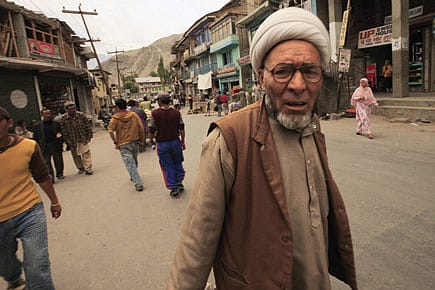The Smiles that Win the War

The most patriotic Indians are the Baltis in Ladakh, the only part of PoK that we managed to wrest back
It's Independence Day, and ideas like patriotism tend to get discussed around this time. I am too shallow a person to rise above the concept. I see nothing wrong with being a patriot, and while a pan-global unified peaceable identity would surely be ideal, we live real lives in real times with real conflicts of interest and real allegiances. I am an Indian.
But the most patriotic Indians I have ever met live in Turtuk in Ladakh, neighbouring Kargil, the only part of Pakistan-occupied Kashmir that we ever managed to wrest back. On 15 December 1971, the Indian Army pushed Pakistani soldiers back from Turtuk and took control. The next day, General Niazi surrendered in Dhaka, and the war was over. If the battles had continued for another fortnight, perhaps all of PoK would have been back in India. I visited Turtuk on work a couple of years after the Kargil war. The war had been fought here too, but had been little reported in the media. And as I walked around the little village on the bank of the Shyok river, I had some remarkable conversations. The love for India was fervent.
My first gut feel was that the villagers were pretending because I had come down from Delhi and I was there at the Army's invitation. But as I spent time with them, I realised that their hospitality and patriotism were absolutely genuine, and I felt ashamed of myself for ever having doubted these simple men. Soldiers told me that during the Kargil war, the menfolk had helped carry mortars up the slopes, the women had cooked food, without being asked, and had carried it up to the soldiers under heavy gunfire.
An aged haji I met told me: "We have lived in Pakistan, so we know what it is like there. We will all die for India." He told me shocking stories of human rights violations and being treated as inferior citizens. "In India, we live with pride," he said. "As full human beings." And to a very large extent, it is the Indian Army that has instilled this pride. The area is administered completely by the Army (standing at the centre of the village, you can see Pakistani soldiers on the heights barely a kilometre away). All infrastructure too. In the late 1990s, General Arjun Ray initiated Operation Sadbhavna, a massive push for development of the region. Good roads, schools, vocational institutes, telephone connections, gas connections, bus services to the nearest town. The results have been extraordinary. I have rarely seen such a happy bunch of people as the Baltis of Turtuk. When an Army jeep passes, little children run out of their homes and wave. Young women hitch lifts in Army vehicles without any doubt or fear. Soldiers know the villagers by name. And almost every family in the village has at least one boy in the Ladakh Scouts. I must, however, admit that though I am using the present tense, I visited there nearly eight years ago. I don't know if things have changed, but what I saw then has left a lasting impression in my head.
Openomics 2026: Continuity and Conviction
06 Feb 2026 - Vol 04 | Issue 57
The performance state at its peak
On the morning of my departure, there was some minor festival to be celebrated. The Army band was rolled out and it started playing its regiment's anthem. Dozens of kids gathered around the band, and all of them sang along. They know the lyrics by heart. Then the drummer got up and handed his drumsticks to a boy, who took his place and started playing. Little girls jumped around in glee. I learnt that the members of the band run an informal music school in the village in the evenings.
I was standing at the side of the stage, looking up across the border at the Pakistani heights. I could see tiny men up there, watching the fun. I am sure, in the clear air, the music would also have been wafting up to them. An old man walked up and stood by me, looking up too. "That is how we win the war every day," he said. "Every day, those soldiers up there see us happy, and we win the war, we demoralise them. They realise they are on the losing side." I left soon after.
